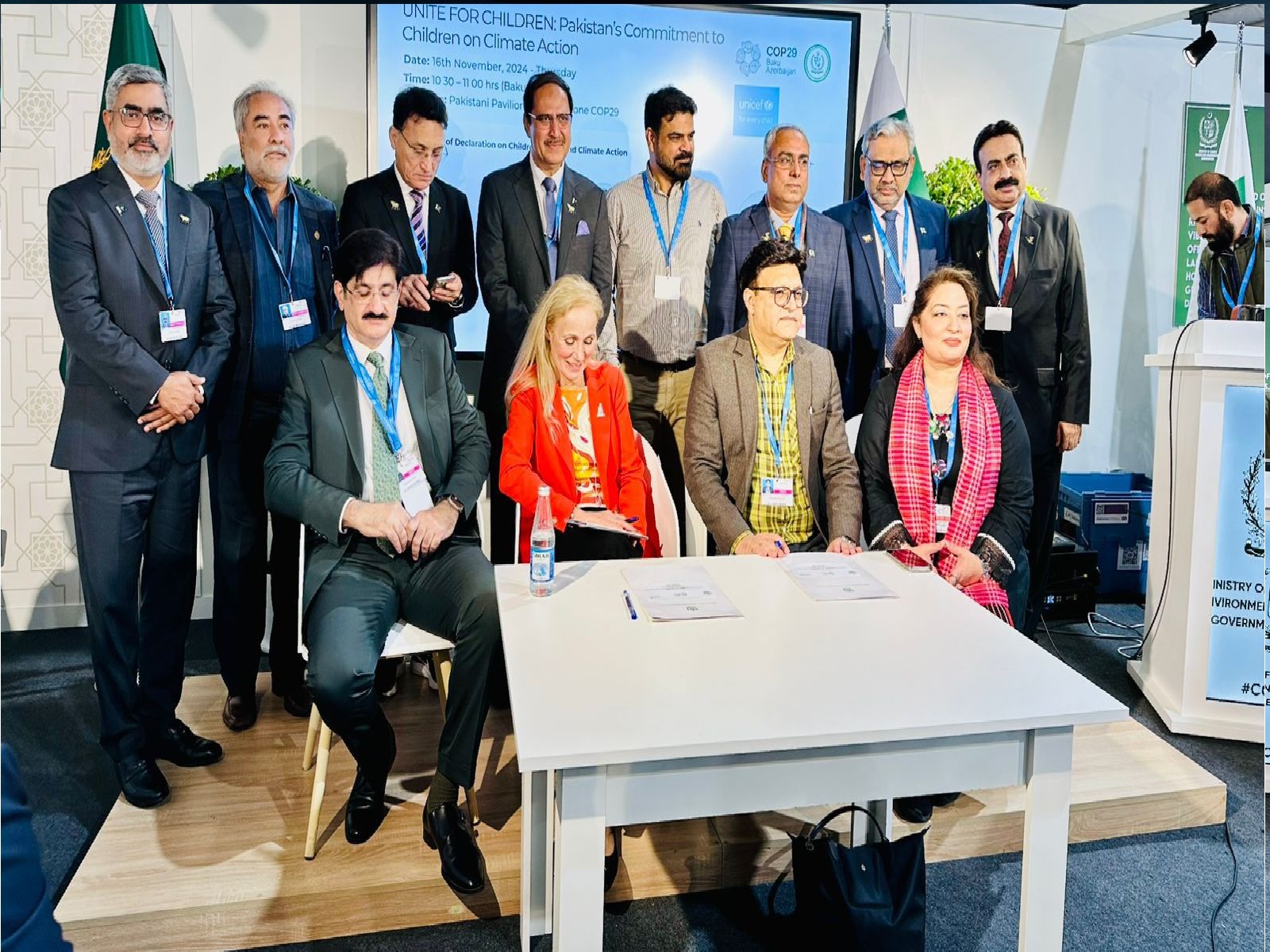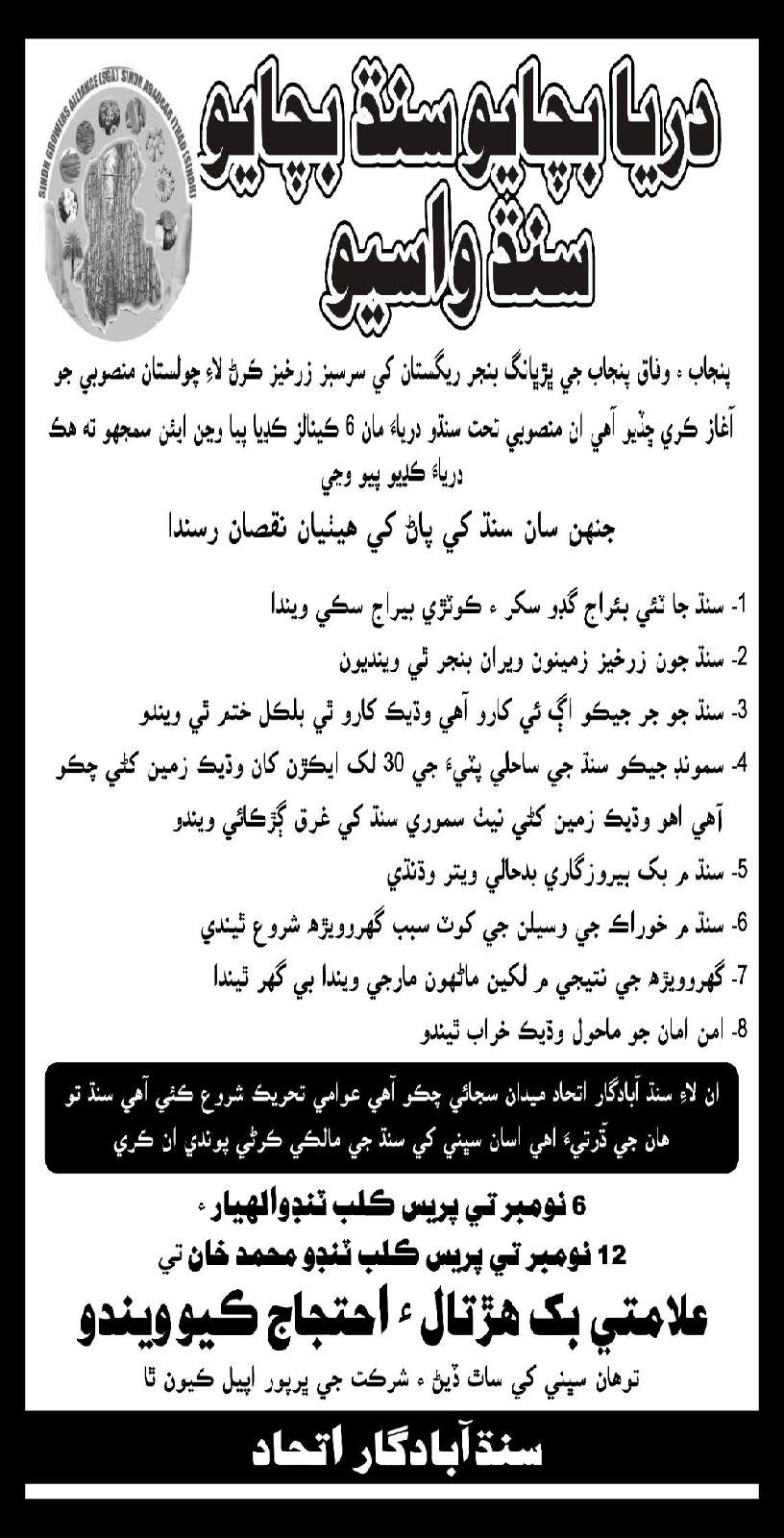Murad unveiled Sindh Delta Blue Carbon Project at COP-29
BAKU (Azerbaijan) Sindh Chief Minister Syed Murad Ali Shah, speaking at COP-29 on Nature’s Carbon Solution, emphasised the transformative Delta Blue Carbon (DBC) project in the Indus Delta, Sindh.
“We have [Sindh] a 230-kilometre coastline and its 667,000 hectares of wetland ecosystems in mitigating and adapting to climate change.”
He said this while speaking at COP-29, titled “Nature’s Carbon Solution: The Delta Blue Carbon Story – Tech Zero: Navigating the Digital Frontier in Coastal Climate Solutions, organised by the Sindh Forest Department, in collaboration with the Delta Blue Carbon Project, hosted a landmark event
The Chief Minister addressed the degradation of mangrove forests caused by past policy failures, deforestation, and reduced freshwater inflow. He detailed the Sindh government’s ongoing efforts to restore these ecosystems since the 1980s.
The Chief Minister was the keynote speaker, presenting the transformative Delta Blue Carbon (DBC) project in the Indus Delta, Sindh. He emphasised the critical role of Sindh’s 230-kilometer coastline and its 667,000 hectares of wetland ecosystems in climate change mitigation and adaptation. Discussing the degradation of mangrove forests due to past policy failures, deforestation, and reduced freshwater inflow, the chief minister detailed his government’s concerted efforts to restore these ecosystems since the 1980s.
The DBC Phase-1 Project, initiated in 2013 and implemented in 2015, emerged as a pioneering public-private partnership between the Sindh Forest and Wildlife Department and Indus Delta Capital (IDC) Limited. This project has become a beacon for blue carbon conservation and restoration, receiving global recognition with Triple Gold Level Validation for its climate change adaptation, biodiversity conservation, and community development benefits.
Murad Shah celebrated the project’s achievements in enhancing Pakistan’s resilience to climate change, improving coastal ecosystems, and fostering sustainable livelihoods. He called for international recognition of such projects and stressed the importance of transparent consultation with project proponents in utilising carbon credits under national commitments.
During a dynamic panel discussion, Ms. Mandy Rambharos, CEO of VERRA, lauded the DBC project for its groundbreaking work in restoring mangroves and creating sustainable livelihoods in the Indus Delta. She emphasised the role of public-private partnerships and innovative technologies in addressing climate challenges, calling the project a model for effective climate action.
The event further highlighted the need to incentivise local communities through initiatives like Mangrove Stewardship Agreements, ensuring sustainable restoration and conservation of blue carbon habitats.
The event concluded with group discussions, where the chief minister underscored Sindh’s leadership in climate adaptation and mitigation. The Delta Blue Carbon Project was hailed as a global example of nature-based solutions and digital innovation in tackling climate change.
This showcase at COP-29 demonstrated Pakistan’s commitment to addressing climate change and the potential of collaborative efforts in securing a sustainable future for coastal ecosystems and local communities.
“We have [Sindh] a 230-kilometre coastline and its 667,000 hectares of wetland ecosystems in mitigating and adapting to climate change.”
He said this while speaking at COP-29, titled “Nature’s Carbon Solution: The Delta Blue Carbon Story – Tech Zero: Navigating the Digital Frontier in Coastal Climate Solutions, organised by the Sindh Forest Department, in collaboration with the Delta Blue Carbon Project, hosted a landmark event
The Chief Minister addressed the degradation of mangrove forests caused by past policy failures, deforestation, and reduced freshwater inflow. He detailed the Sindh government’s ongoing efforts to restore these ecosystems since the 1980s.
The Chief Minister was the keynote speaker, presenting the transformative Delta Blue Carbon (DBC) project in the Indus Delta, Sindh. He emphasised the critical role of Sindh’s 230-kilometer coastline and its 667,000 hectares of wetland ecosystems in climate change mitigation and adaptation. Discussing the degradation of mangrove forests due to past policy failures, deforestation, and reduced freshwater inflow, the chief minister detailed his government’s concerted efforts to restore these ecosystems since the 1980s.
The DBC Phase-1 Project, initiated in 2013 and implemented in 2015, emerged as a pioneering public-private partnership between the Sindh Forest and Wildlife Department and Indus Delta Capital (IDC) Limited. This project has become a beacon for blue carbon conservation and restoration, receiving global recognition with Triple Gold Level Validation for its climate change adaptation, biodiversity conservation, and community development benefits.
Murad Shah celebrated the project’s achievements in enhancing Pakistan’s resilience to climate change, improving coastal ecosystems, and fostering sustainable livelihoods. He called for international recognition of such projects and stressed the importance of transparent consultation with project proponents in utilising carbon credits under national commitments.
During a dynamic panel discussion, Ms. Mandy Rambharos, CEO of VERRA, lauded the DBC project for its groundbreaking work in restoring mangroves and creating sustainable livelihoods in the Indus Delta. She emphasised the role of public-private partnerships and innovative technologies in addressing climate challenges, calling the project a model for effective climate action.
The event further highlighted the need to incentivise local communities through initiatives like Mangrove Stewardship Agreements, ensuring sustainable restoration and conservation of blue carbon habitats.
The event concluded with group discussions, where the chief minister underscored Sindh’s leadership in climate adaptation and mitigation. The Delta Blue Carbon Project was hailed as a global example of nature-based solutions and digital innovation in tackling climate change.
This showcase at COP-29 demonstrated Pakistan’s commitment to addressing climate change and the potential of collaborative efforts in securing a sustainable future for coastal ecosystems and local communities.



Comments (0)